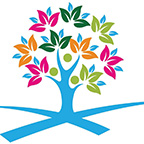
Friendships provide children with more than just fun playmates or people to hang out with. Through interacting with friends, children learn important social skills – how to communicate, cooperate, solve problems, and make decisions. Research shows that children with healthy friendships have a greater sense of well-being, better self-esteem, and fewer social problems later in life. Children’s school performance is also impacted by friendships. When children have friends at school, they tend to have better attitudes about school and learning.
Friendships also provide opportunities for children to learn conflict resolution skills. Conflict is a normal process that all children will experience from time to time. The dilemma for many parents, however, is how to respond when this happens. As parents, it is painful to watch your children suffer hurt, rejection, and isolation when they fight with their friends. It is likely to spark the desire to want to fix the problem for him, however, this is not what your child needs. Your child needs your love and encouragement and also your guidance in figuring out how he wants to solve the problem. With your support, your child can learn invaluable skills and develop confidence in his own abilities.
Below are some general guidelines to help you provide your child support and encouragement and also show him a way to solve problems.
Listen to your child. Listen to your child in a kind caring way. As you listen to your child, avoid giving advice or criticism. Even resist the urge to talk about similar experiences of your own. Talking about your own experience could seem to your child that you are not listening to what they are saying about their experience.
Help your child identify the problem. Your child may be able to express what the problem is at the beginning of the conversation or they may have to talk awhile to get to it.
Help your child brainstorm solutions. Avoid telling your child what to do. Instead, ask them, “What could you do in this situation?” If they say, “I don’t know,” invite them to brainstorm with you, to think up any possible solutions. Write down all suggestions without evaluating them.
Help your child choose a solution. After your child has suggested several solutions, discuss the pros and cons of each one.
Most of the time, helping your child think through what they wants to do about a problem is the best help you can give them. For example, if you know your child wants to resolve an argument with their best friend, you can help arrange a time for them together in a low-stress environment, such as a park. You can provide the opportunity for your child to work out a problem with their friend without getting too involved or trying to solve the problem for them.
While every child faces social problems at some time, it is important to distinguish between normal friendship disagreements and more serious problems such as bullying or not having any friends at all. If this happens you may want to talk to your child’s teacher, a school counselor, or a family counselor for additional help.
At Crossroads Family Counseling Center we offer groups for boys and girls focusing on building social skills and improving friendships.
Website for kids about developing and maintaining friendships
Written by: Denise Booth who is a Virginia Licensed Clinical Social Worker (LCSW) with over 10 years experience working with children and families. She specializes in providing therapy to adolescents dealing with behavioral issues at home and school, as well as anxiety, depression, self-esteem, substance abuse trauma and PTSD,. In her work with parents, she strives to enhance parent-child relationships and strengthen parenting skills to cope with adolescents..

